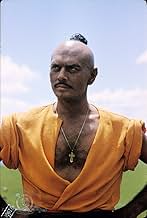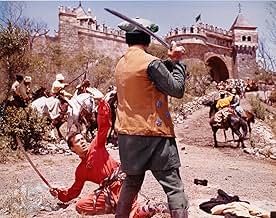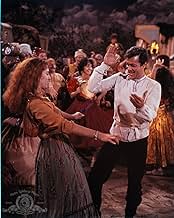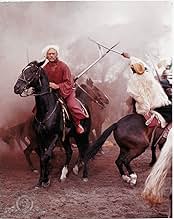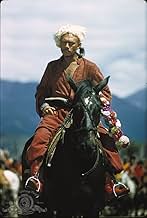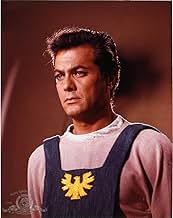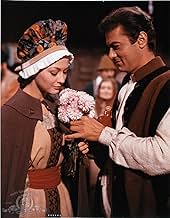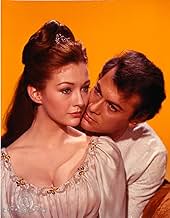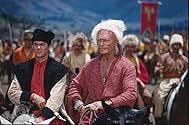VALUTAZIONE IMDb
6,3/10
4805
LA TUA VALUTAZIONE
Nell'Ucraina del XVI secolo, i grandi feudatari polacchi e i cosacchi ucraini combattono per il controllo della terra, ma le frequenti invasioni turche li costringono a unirsi contro il nemi... Leggi tuttoNell'Ucraina del XVI secolo, i grandi feudatari polacchi e i cosacchi ucraini combattono per il controllo della terra, ma le frequenti invasioni turche li costringono a unirsi contro il nemico comune.Nell'Ucraina del XVI secolo, i grandi feudatari polacchi e i cosacchi ucraini combattono per il controllo della terra, ma le frequenti invasioni turche li costringono a unirsi contro il nemico comune.
- Regia
- Sceneggiatura
- Star
- Candidato a 1 Oscar
- 3 candidature totali
Leon Alton
- Servant
- (non citato nei titoli originali)
Recensioni in evidenza
Borrowing from Gogol the title ,the proper nouns and the son's killing,Jack Lee Thompson's movie is quite entertaining,ideal for a rainy day or after a hard day's work.
The first part is the most interesting: the scenes at the university with its sadistic monks -while one of them is flogging the rebel students,the other kneels down and pray- and its "racism" : a lot of Pole Students cannot accept the fact that those primitive savage cossacks study in their school.Curtis was almost emasculated "to prevent him from sullying Pole girls." It sometimes recalls"Romeo and Juliette",which Christine Kaufman's resemblance with Olivia Hussey who would play the part of Juliette six years later reinforces.Yul Brynner is ideally cast as Taras.
The 1936 French version ("Tarass Boulba" French spelling)mainly deals with the second part -the siege- and the stories are similar with the same love interest.
The first part is the most interesting: the scenes at the university with its sadistic monks -while one of them is flogging the rebel students,the other kneels down and pray- and its "racism" : a lot of Pole Students cannot accept the fact that those primitive savage cossacks study in their school.Curtis was almost emasculated "to prevent him from sullying Pole girls." It sometimes recalls"Romeo and Juliette",which Christine Kaufman's resemblance with Olivia Hussey who would play the part of Juliette six years later reinforces.Yul Brynner is ideally cast as Taras.
The 1936 French version ("Tarass Boulba" French spelling)mainly deals with the second part -the siege- and the stories are similar with the same love interest.
Taras Bulba is directed by J. Lee Thompson and adapted to the screen by Waldo Salt and Karl Tunberg from a story by Nikolai Gogol. It stars Yul Brynner, Tony Curtis, Christine Kaufmann and Perry Lopez. Out of United Artists, it's a DeLuxe/Eastman Color/Panavision production, with the music scored by Franz Waxman and cinematography by Joseph MacDonald.
Loosely based on Gogol's short novel, story tells of a Cossack uprising against the Polish forces who have taken control of the Ukraine. At the centre of the Cossack army is the leader Taras (Brynner) and his two sons, Andrei (Curtis) and Ostap (Lopez). But when Andrei falls in love with a Polish princess called Natalia (Kaufmann), it sets the wheels in motion for the Bulba family to crack from within; just as the Polish come calling asking for the Cossacks' help to defeat the Turkish.
While not as epic as the film, the troubled back story of the production is big enough to lend one to understand why Taras Bulba is not the grandiose picture the story deserves. Main problem comes with casting, particularly that of Curtis as the elder Bulba son. It should have been Burt Lancaster, who walked, so in came Curtis and a decision was made to put him front and centre of the picture. Thus rendering Brynner's title character to playing second fiddle, so much so they really should have called the film Andrei Bulba instead. On his day Curtis could act, but he's out of place here playing a Cossack with brain and brawn. Then there was the small matter of Curtis' marriage to Janet Leigh falling apart, with Leigh visiting the set, falling ill and no doubt noticing the sparks flying between Curtis and his delectable co-star, Kaufmann. Curtis would say it wasn't the final straw, but with him going on to marry Kaufman shortly after his divorce, it's hard not to think that it sealed the deal!
He's not helped by the writers, though, who allow the love story sub-plot between Andrei and Natalia to form the core of the plot. They too, Messrs Salt & Tunberg, were brought in after historical novelist Howard Fast (Spartacus) refused to tone down the screenplay. He wanted to include what was an important part of the Cossack/Pole war, that of the Cossacks anti-Semitic attack on Polish Jews. The makers balked and Salt & Tunberg came in and delivered the Andrei overkill and some rather cheese laden dialogue. Brynner was crushed, his biography (written by his son Rock) reveals that it was a role and film he cared for more than any other, he had grand plans for the portrayal but the makers didn't share his view. A shame because what we do get of Brynner is wonderfully exuberant, muscular and (correctly) scene stealing.
However, when Taras Bulba as a film is good, it's real good, and thankfully it's never dull, even if it's a bit more jovial in the mid section than it is meant to be. Thompson was a fine director of action and suspense, and he gets to flex his muscles here to great effect. Casting aside the cheap shots of dummies and wooden horses being hurled about a couple of times, the sight of thousands of men on horseback swarming across the Steppes (actual location used was Argentina) is spectacular. The battles are fierce, violent and gripping, while the scenes in the Cossacks camps are joyous as men drink, sing, test their manhood by doing things like dangling over a bear pit, it's all very robust and Vikingesque, but entertainingly so. There's even some dashing sword play, while quality suspense is eked out during a challenge to the death over a seemingly bottomless gorge.
Joseph MacDonald's Panavision photography neatly brings the wide vistas to life, aided by the use of Eastman Color which gives off a nice period hue. Waxman delivers a blunderbuss score that's seasoned with Russian vitality, while the costume department deserves a mention for their efforts, particularly for the Polish army who look dandy men of steel. Yes it's a film of flaws and bad decisions, but the good does outweigh the bad in this instance, and how nice it is to have the chance to see a little known part of "bloody" history up there on the screen. 7/10
Loosely based on Gogol's short novel, story tells of a Cossack uprising against the Polish forces who have taken control of the Ukraine. At the centre of the Cossack army is the leader Taras (Brynner) and his two sons, Andrei (Curtis) and Ostap (Lopez). But when Andrei falls in love with a Polish princess called Natalia (Kaufmann), it sets the wheels in motion for the Bulba family to crack from within; just as the Polish come calling asking for the Cossacks' help to defeat the Turkish.
While not as epic as the film, the troubled back story of the production is big enough to lend one to understand why Taras Bulba is not the grandiose picture the story deserves. Main problem comes with casting, particularly that of Curtis as the elder Bulba son. It should have been Burt Lancaster, who walked, so in came Curtis and a decision was made to put him front and centre of the picture. Thus rendering Brynner's title character to playing second fiddle, so much so they really should have called the film Andrei Bulba instead. On his day Curtis could act, but he's out of place here playing a Cossack with brain and brawn. Then there was the small matter of Curtis' marriage to Janet Leigh falling apart, with Leigh visiting the set, falling ill and no doubt noticing the sparks flying between Curtis and his delectable co-star, Kaufmann. Curtis would say it wasn't the final straw, but with him going on to marry Kaufman shortly after his divorce, it's hard not to think that it sealed the deal!
He's not helped by the writers, though, who allow the love story sub-plot between Andrei and Natalia to form the core of the plot. They too, Messrs Salt & Tunberg, were brought in after historical novelist Howard Fast (Spartacus) refused to tone down the screenplay. He wanted to include what was an important part of the Cossack/Pole war, that of the Cossacks anti-Semitic attack on Polish Jews. The makers balked and Salt & Tunberg came in and delivered the Andrei overkill and some rather cheese laden dialogue. Brynner was crushed, his biography (written by his son Rock) reveals that it was a role and film he cared for more than any other, he had grand plans for the portrayal but the makers didn't share his view. A shame because what we do get of Brynner is wonderfully exuberant, muscular and (correctly) scene stealing.
However, when Taras Bulba as a film is good, it's real good, and thankfully it's never dull, even if it's a bit more jovial in the mid section than it is meant to be. Thompson was a fine director of action and suspense, and he gets to flex his muscles here to great effect. Casting aside the cheap shots of dummies and wooden horses being hurled about a couple of times, the sight of thousands of men on horseback swarming across the Steppes (actual location used was Argentina) is spectacular. The battles are fierce, violent and gripping, while the scenes in the Cossacks camps are joyous as men drink, sing, test their manhood by doing things like dangling over a bear pit, it's all very robust and Vikingesque, but entertainingly so. There's even some dashing sword play, while quality suspense is eked out during a challenge to the death over a seemingly bottomless gorge.
Joseph MacDonald's Panavision photography neatly brings the wide vistas to life, aided by the use of Eastman Color which gives off a nice period hue. Waxman delivers a blunderbuss score that's seasoned with Russian vitality, while the costume department deserves a mention for their efforts, particularly for the Polish army who look dandy men of steel. Yes it's a film of flaws and bad decisions, but the good does outweigh the bad in this instance, and how nice it is to have the chance to see a little known part of "bloody" history up there on the screen. 7/10
I agree with most of the posts. However, one area that does not get attention is the soundtrack to the movie. When the Cossacks gather and ride to the Polish city to fight, the music is truly great. Having seen the movie over 40 years ago I can still hear the music of the ride to Dubnoi over and over in my head. I find it intoxicating!! Yul Brenner is made for the part of Tarus. I could never see Tony Curtis as a Ukrainian prince and his looks do not fit the part. He is however a Hungarian of Eastern European descent. This is a fun movie that has a great score, cinematography, and some interesting scenes and performances. The Yul Brenner song is laughable though.
Taras Bulba is the story of the Cossack's fight for freedom, a fight to reclaim their beloved land from the Poles. It is also a story of a father's love and pride for his son. Yul Brynner is the definitive Cossack in this movie. His swagger and bigger than life persona is the perfect match for Taras. His portrayal is both powerful and moving. Added to that is the fantastic horseback battle scenes on the Steppes. The scenes where the Cossack regiments gather with a rallying cry are awesome. Those alone deserve a 10.
The story of Taras Bulba had the potential to be a great historical epic had it focused on Taras' struggle between his love for the Cossack way of life and that for his son. Unfortunately, given the box office requirements of the time, the studio execs decided to toss in a cheesy love story (complete with fuzzy close-ups) and Tony Curtis, with his matinée-idol hairdo untouched. That just jars you out of the period. According to his biography, Brynner worked long and hard to bring the rich character to life, but broke down when he saw the final cut. That said, this movie still deserves a watch if only to see the magnificent Yul Brynner and the wonderfully choreographed battle sequences.
The story of Taras Bulba had the potential to be a great historical epic had it focused on Taras' struggle between his love for the Cossack way of life and that for his son. Unfortunately, given the box office requirements of the time, the studio execs decided to toss in a cheesy love story (complete with fuzzy close-ups) and Tony Curtis, with his matinée-idol hairdo untouched. That just jars you out of the period. According to his biography, Brynner worked long and hard to bring the rich character to life, but broke down when he saw the final cut. That said, this movie still deserves a watch if only to see the magnificent Yul Brynner and the wonderfully choreographed battle sequences.
I have not seen Taras Bulba for many years and just came online to try and buy a copy. No mention of it at all on Amazon, as if it had never existed. No-one could ever forget the contest as the horses jump the gradually widening ravine, and the defeat in victory for the young Andrei (Tony Curtis) as the old warrior dies. When my wife married me nearly 20 years ago she reminded me of the times I had quoted the polish commander, excuse me if it is not quite accurate but it went something like this. "If we could harness the power of love we could rule the world" So many have tried other ways but still only the power of love will overcome all in the end.
Lo sapevi?
- QuizAccording to director J. Lee Thompson, in an interview in Yul Brynner: The Man Who Was King (1995), there was a misunderstanding with the hundreds of Argentine gauchos playing horsemen . They were told that horsemen who fell off their horse during an attack scene would be paid extra--but only those who were directed to do so. When the scene was shot, two-thirds of them fell off their horses and expected the extra pay. Upon being told they were not going to be paid extra, they threatened to strike. Yul Brynner then took steak dinners out to their encampment that evening and spent hours entertaining them. Impressed by this, the gauchos returned to work the next day.
- BlooperThe Cossack's "scalp-lock" is not on the back but the front! Only the old Cossack is the one that has it correctly.
- Curiosità sui creditiThanks to the army of the Argentine Republic.
- ConnessioniEdited into Kronos: Attack of the Barbarians (1967)
I più visti
Accedi per valutare e creare un elenco di titoli salvati per ottenere consigli personalizzati
- How long is Taras Bulba?Powered by Alexa
Dettagli
Botteghino
- Budget
- 7.000.000 USD (previsto)
- Lordo in tutto il mondo
- 22.533 USD
- Tempo di esecuzione
- 2h 2min(122 min)
- Proporzioni
- 2.39 : 1
Contribuisci a questa pagina
Suggerisci una modifica o aggiungi i contenuti mancanti


